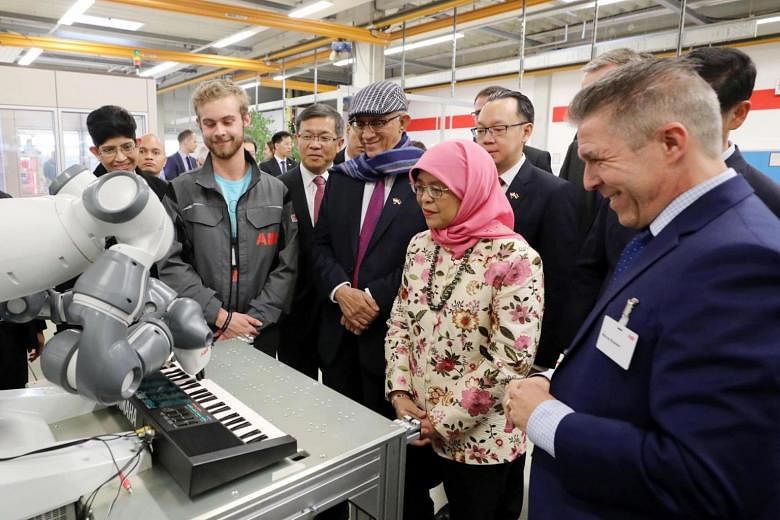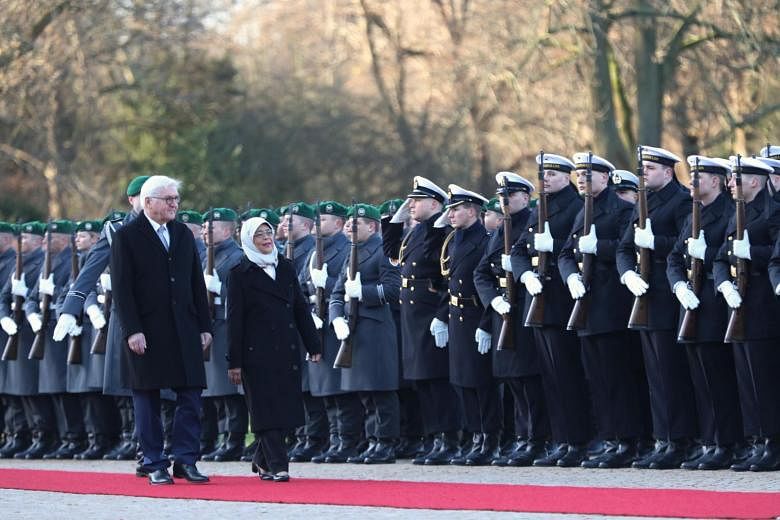FRANKFURT - Singapore can learn much from Germany's education system, which places a great emphasis on skills and craftsmanship, and has contributed to the growth of the country's industry and workers, said President Halimah Yacob on Friday (Dec 13).
Speaking to media in Frankfurt at the end of her five-day state visit to Germany which focused on education and the workforce, Madam Halimah noted how the deep involvement of German companies is critical for the success of the country's dual education system.
Under the dual education system or apprenticeship system in Germany, companies and education institutions work together to teach students over three years.
Students often go on to work full time at the companies they train at, although they are also free to move to another company.
"German companies actually pay for the trainees' training over three to 3½ years. One company told me they paid as much as €70,000 (S$105,000 to €80,000 for each trainee," said Madam Halimah, who met German vocational apprentices when she visited auto manufacturing firm Continental AG and electrical equipment company ABB Stotz on Thursday.
"The German education system is very effective in helping young people to integrate into the industry... We also want to create different pathways and careers for our people so a dual education system is very important for us as we progress."
A total of 14 memorandums of understanding and agreements were signed during Madam Halimah's state visit, with half of them in education.
During the visit, a first by a Singapore President to Germany, Madam Halimah also met German President Frank-Walter Steinmeier, Chancellor Angela Merkel and Minister-President Volker Bouffier of the German state of Hesse.
Thanking the German leaders for their warmth and hospitality, Madam Halimah said she enjoyed their conversations, which revolved around both countries' common challenges, including the issue of rising social polarisation.
"Around the world, as we have seen, the lack of social cohesion can be disruptive to economic growth and development. You can't separate the two," she said.
"And in my conversations not just with German political leaders but also business leaders, they wanted to know about the social cohesion we have despite the huge diversity in our society."
Madam Halimah also hailed the European Union-Singapore Free Trade Agreement- which came into effect last month - as an important milestone and expressed her hopes that the EU-Singapore Investment Protection and Partnership Cooperation Agreement would be ratified soon.
She said there is further scope for more collaboration in the areas of research, innovation and technology, with her visit featuring a number of tie-ups between German partners and Singaporean organisations such as the Economic Development Board, Enterprise Singapore and SGInnovate.
"The Germans are also going through huge technological disruption... but they are leveraging very much on their strengths in hardware and education," said Madam Halimah.
"We also have strengths, which are in software and systems integration, and this is where we can look at ways on how to synergise, co-innovate and collaborate."
Madam Halimah's state visit to Germany is her fourth for the year, after visits to the Philippines, Kuwait and Saudi Arabia. She also made two working visits, one to China and another to Japan.
She returned to Singapore on Saturday.




